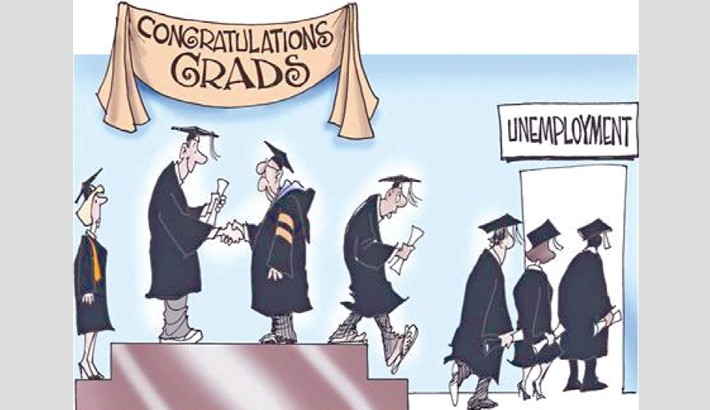Does a First Class Translate To Success in Life?

“5.0 or nothing”. My roommates chant it like a prayer. It’s not just a goal; it’s clutching the nearest lifeline in a country where the only ticket to survival seems to be a first-class degree. On the World Youth Skills Day on July 15th, I walked through the streets of Agbowo with fellow students, chanting: “Education isn’t enough! Learn a skill!” Yet by midnight, those same faces were hunched over textbooks, eyes glazed, the only thought occupying their minds: academic excellence. We chase first class like it’s a luxury ticket. But what are we really winning?
Success, as a single, predetermined goal, is an illusion, a hazy target invented by people who crave progress but can’t define it. It isn’t a trophy to be clutched, but a spectrum−shifting, fluid, and as personal as a fingerprint. Take three medical students, for example. One dreams of being at the forefront of cancer research. Another wants to rewrite Nigeria’s health policies for the less privileged. The third lives to merge robotics with therapeutics. Can success truly wear the same face for all three? Yet we force their ambitions through the same sieve, measuring their worth on a scale that reduces dreams to a number between 4.5 and 5.0, as if Edison’s inventions needed his high school grades for validation or Soyinka’s plays required a dean’s approval to resonate.
We have so many examples of trailblazers who didn’t have great grades in school. Thomas Edison had to be removed from school and homeschooled because his teacher called him “addled”, yet he became one of the most prolific inventors in science. Mark Twain never had formal education beyond elementary school, yet his books are read everywhere. Nigerian comedian, Josh2Funny, never went past secondary school, but there is hardly any Nigerian who has not seen his skits.
And what happens when the very system used to measure success is broken? It would have been a different case if a GPA reflected all-around excellence within an optimal learning environment. But in the average Nigerian university, we find outdated curricula built on irrelevant coursework (a medical student offering calculus), lecturers who barely care if students comprehend the lesson and breeze through a hundred-page topic in thirty minutes, laboratories that lack basic equipment, equipment older than students’ parents and many more eyesores. Not all institutions are like this, but when three out of five lecturers walk in unprepared, it’s no longer just inefficiency; it is betrayal masquerading as education.
I don’t argue that a first class isn’t an award of excellence, but in thorough assessment, it’s a narrow one. It honors intellect while sidelining emotional competence, which is what Daniel Goleman, in “Emotional Intelligence: Why It Can Matter More Than IQ”, argues accounts for nearly 90% of what distinguishes top performers. He references Bell Labs engineers where the most valued weren’t those with the highest IQs, but those who built strong networks through empathy and collaboration.
Teamwork. Emotional regulation. Communication. These are essentials in any field. Yet in our system, group work becomes an exercise in scarcity. For example, five students have to huddle around one microscope, starving for access. Communication means presenting facts that were likely memorized. Emotions? They are seen as weakness, Western indulgence. Then we wonder why distinguished doctors can’t comfort grieving families, but we never ask why our exams only test recall.
On the other hand, if emotional intelligence drives real-world success, why are we still training robots instead of humans? Then what should success mean? We must peel back the deceptive layers and confront success in its purest form—a deeply personal journey that resists standardization. True success cannot be measured by institutional validation, or a 5.0 scale. It reveals itself in the application of knowledge, not its accumulation. It flourishes in impact, not prestige. It thrives in fulfillment, not external approval.
From the teacher whose students master complex equations, to the entrepreneur disrupting entire industries, from the nurse who comforts terminal patients, to the artist who challenges societal norms, success wears as many faces as humanity itself. A first-class degree is certainly an honorable achievement. It is a testament to discipline and intellectual rigor. But let us be clear: it is proof of academic performance, not a predictor of life achievement.
History remembers Marie Curie for her discoveries, not her GPA, Chinua Achebe for his stories and not his transcripts, Steve Jobs for transforming the digital world and not for topping a class. How many first-class graduates can we name?
Regardless, a first-class is very important. Just like emotional intelligence, work ethics and vocational development are crucial for a balanced life, academic excellence is equally as invaluable. We have seen many people rise to great heights through impressive academic performance. For many job applications in Nigeria, excellent academic records are an important component for a successful application. However, job opportunities are very limited in Nigeria. According to Clement Agba, the Minister of State, Budget and National Planning, there were 74.6 million unemployed youths in Nigeria in 2023. This week, Nigerian artiste AG Baby awarded first-class graduates with cash prizes. Among them was a graduate of Physics with a CGPA of 4.91/5.00. This student is not working in any Physics-related field as we speak. From school, he has had a tailoring business which he still uses to subsist today. This speaks volumes about the state of graduate employment in Nigeria. Banking on academic excellence alone is not just blind faith, it’s a bullet to the leg.
When we mistake academic distinction for life success, we don’t just distort reality — we amputate ambition at the knees. Ultimately, success must be reclaimed. Each person must have the courage to define excellence on their own terms, whether that means revolutionising an industry, or simply revolutionising one life—your own. For one person, academic excellence may be the pathway. That doesn’t mean it has to be the same for the next person.



Apt. Unarguably, the best article that I have ever read in this School…God bless the writer
Very clear, creative and captivating write up